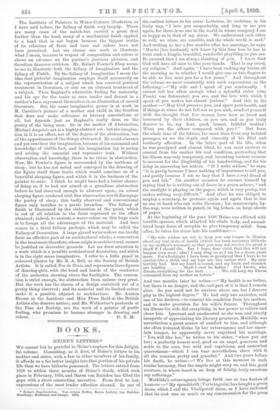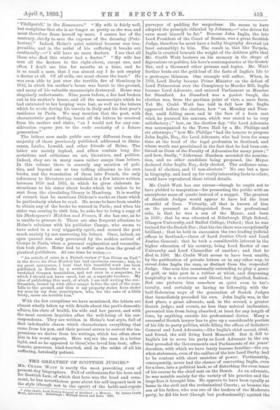BOOKS.
HEINE'S LETTERS.* WE cannot but be grateful to Heine's nephew for this delight- ful volume. Consisting, as it does, of Heine's letters to his mother and sister, with a few to other members of his family, it affords us a far better insight into that portion of his private life than we have hitherto possessed. The letters extend from 1820 to within three months of Heine's death, which took place in February, 1856, and Baron von Embden has filled the gaps with a short connecting narrative. From first to last, expressions of the most tender affection abound. In one of • Hoin•'e Familienleben. Von aelnem Neffea, Baron Ludwig on Embden. Eambarg c Hoffmann and Campo. 1882. the earliest letters to his sister Lottchen, he exclaims, in his lively way, " I love you unspeakably, and long to see you again, for there is no one in the world in whose company I am so happy as in that of my sister. We understand each other so well, we alone are sensible, and the whole world is mad."
And writing to her a few months after her marriage, he says, "Moritz [her husband] will know by this time how he has to treat such a fragile, beautiful, wonderful plaything as you are.
Be assured that I am always thinking of you. I know that God will have all men to kiss your hands. That is my creed, my religion." And again, " I have been racking my brains all the morning as to whether I would give one or two fingers to be able to live near you for a few years." And throughout the volume we meet constantly with such expressions as the following :—" My wife and I speak of you continually. I cannot tell her often enough what a splendid sister (eine Pracht von Schwester) you are, and the love with which I speak of you makes her almost jealous." And this to his mother :—" May God preserve you, and spare your health, and if things at times do not fall out as you wish, comfort yourself with the thought that few women have been so loved and honoured by their children, as you are, and as you truly deserve to be, my dear, good, honest, faithful mother ! What are the others compared with you P " But from the whole tone of the letters, far more than from any isolated passages, we see the depth and sincerity of his filial and brotherly affection. In the latter part of his life, when he was paralysed and almost blind, he was most anxious to conceal from his mother his real condition, pretending that his illness was only temporary, and inventing various reasons to account for the illegibility of his handwriting, and for his delay in answering her letters. "If I write seldom," he says, " it is partly because I have nothing of importance to tell you, and partly because I am so lazy that I have a real dread of pen and ink." On another occasion he excuses himself by saying that he is writing out of doors in a green arbour, "and the sunlight is playing on the paper, which is very pretty, but makes writing very difficult." And after he was obliged to employ a secretary, he protests again and again that he has no one at hand who can write German ; his manuscripts, by- the-way, were written in pencil, in big letters, on large sheets of paper.
At the beginning of the year 1848 Heine was afflicted with terrible spasms, which attacked his whole body, and necessi- tated large doses of morphia to give temporary relief. Soon after, he takes his sister into his confidence :— "My wife wishes me not to keep you any longer in illusion about my real state of health (which has been necessary hitherto on my mother's account), so that you may not receive too great a shook if I should die. But I hope, dear child, that this will not happen very soon; alas! I may drag on as I am for a dozen years more. For a fortnight I have been so paralysed that I have to be carried like a child, and my legs are like cotton. wool. My eyes terribly bad. But my heart is sound, and my brain and stomach
are healthy Shall I ever be better ? God knows, who
directs everything for the best We will keep my illness
concealed from ray mother as before."
And two months later he writes :—" My health is no better, but there is no danger, and the sad part of it is that I remain alive. So you need not be anxious about me, but I deserve pity in the highest degree." He had only two anxieties, said one of his doctors,—to conceal his condition from his mother, and to make provision for his wife's future. Throughout his illness his wife did everything in her power to relieve and cheer him. Ignorant and uneducated as she was, and utterly incapable of appreciating his literary greatness, Mathilde was nevertheless a great source of comfort to him, and although she often irritated Heine by her extravagance and her uncer- tain temper, he apparently never regretted his marriage. "Yon. will like her," he writes to his sister, "when you see her; a perfectly honest soul, good as an angel, generous and noble to the core, but wild and capricious, and somewhat quarrelsome—which I can bear nevertheless, since with it all she remains pretty and graceful." And two years before his death, he writes :—" We live at this moment in such tender harmony, that the angels might envy no, and this good creature, in whose heart is no drop of falsity, truly sweetens my sufferings."
Mathilde's extravagance brings forth one or two flashes of humour :—" My spendthrift (Verbringerin) has bought a green dress, which I call the Vitzliputzli dress, as I have reckoned that its cost was as much as my remuneration for the poem Vitzliputzli,' in the Romancere." "My wife is fairly well, but complains that she is no longer so pretty as she was, and must therefore dress herself up more. I assure her of the contrary, chiefly to save the expense of the dressing (Putz- kosten)," Indeed, Heine's quiet satirical humour was irre- pressible, and in the midst of his suffering it breaks out continually :—" I will have no more doctors. I see that all those who died this winter had a doctor." "My wife has sent all the doctors to the right-about, except one, and often I don't see him for months at a time, and he is so small a man, that I can almost say I do not employ a doctor at all. Of all evils, one must choose the least." He was even able to jest over the terrible fire of Hamburg in 1842, in which his mother's house was burnt to the ground, and many of his valuable manuscripts destroyed. Heine was singularly unfortunate. Nine years before, a fire had broken out in his mother's house, and all the manuscripts which he had entrusted to her keeping were lost, as well as the letters which he wrote during his travels in Italy and his first year's residence in Paris. We may mention that the poet, with characteristic good feeling, burnt all the letters he received from his mother and sister, "-as I would not for any con- sideration expose you to the rude curiosity of a future generation."
The letters now made public are very different from the majority of those previously published, addressed to Stein- mann, Laube, Lewald, and other friends of Heine. The latter are mainly topical, and often contain long dis- sertations and criticisms on art, literature, and politics. Indeed, they are in many cases rather essays than letters. In this volume there is scarcely any mention of poli- tics, and beyond one or two trifling allusions to his own books, and the translation of them into French, the only references to literature are contained in a few letters written between 1850 and 1855, in which he gives elaborate in- structions to his sister about books which he wishes to be sent from the circulating library in Hamburg. It is worthy of remark that he mentions Dickens's works as those which he particularly wishes to read. He seems to have been unable to obtain any of the books he wanted in Paris ; and when his sister was coming to visit him, he asks her to bring a copy of his Shakespeare's Madehen and Frauen, if she has one, as he is unable to procure it. There are also frequent allusions to Heine's relations with his publisher Campo, who seems to have acted in a very niggardly spirit, and caused the poet much anxiety by not answering his letters. Once, indeed, an open quarrel was only prevented by the sudden arrival of OaMpe in Paris, when a personal explanation and reconcilia- tion took place. Heine had to suffer also from the greed of piratical publishers. At one time he writes :— " An article of mine in a French review ("Les Dieux en Bail" in the Revue des Deux M'ondes) has had enormous success I but, to my great annoyance, I hear that this beautiful work has been published in Berlin by a wretched German bookseller in a wretched German translation, and not even in a magazine, for which I should not have cared, but as a separate brochure. My idea of publishing this work, of which I am still writing the con- tinuation, bound up with other essays before the end of the year, falls to the ground, and thus is my property stolen from under my nose by my dear countrymen, who, for the sake of a little booty, cause me terrible loss."
With the few exceptions we have mentioned, the letters are almost wholly taken up with details about the poet's domestic affairs, his state of health, his wife and her parrot, and with the most anxious inquiries after the well-being of his cor- respondents. They are written in Heine's best style, full of that indefinable charm which characterises everything that came from his pen, and their perusal serves to correct the im- pressions we derive from his writings, which too often show him in his worst aspects. Here wej see the man in a better light, and as he appeared to those:who loved him best; affec- tionate, generous, kind-hearted, and in the midst of all his suffering, heroically patient.



































 Previous page
Previous page